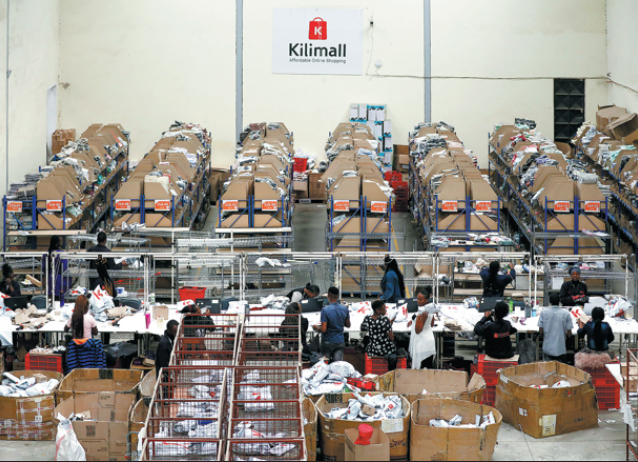E-commerce widening Africa's online market


When Benard Mungai started his shoe business in Nairobi, Kenya, back in 2015, he could only trade in secondhand shoes in the city's Gikomba open air market. However, as his business grew over the years, he managed to open his first shop in 2018 and needed to upgrade his stock to new shoes for his customers. After various endeavors to secure a reliable supply of merchandise, he came across Kilimall, a local e-commerce platform.
"It was recommended by my fellow traders. From this website, I can order goods from any country in Asia, Europe or the Americas and many other places across the globe which do not ship to Kenya. Most importantly, their turnaround is fast," Mungai said.
Taking advantage of the e-commerce platform, Mungai has earned his clients' trust for delivering genuine sneakers, sports jerseys and other items because he gets his supplies from the source through the online hub, which sources them directly from prequalified merchants and delivers directly to him.
Kilimall, which was founded by Yang Tao, a former employee of a Chinese tech firm's branch in Kenya in 2014, has so far grown to be a leading e-commerce platform in Kenya, attracting more than 10 million registered users and an average of over 1 million monthly visitors.
The popularity of e-commerce has transformed business models in the East African country and brought great convenience to the lives of locals. In Nairobi, online shopping and food delivery are as popular and swift as in China.
Kilimall's senior marketing supervisor Dickson Nganga said that the platform offers services that provide more variety and convenience for shoppers, especially those in businesses, by saving them the cost and trouble of traveling to far-away markets.
Nganga pointed out that there is increasing demand for numerous products from different global markets, and through online shopping they hope to tap into the growing demand for global products from East Africa's bulging middle-income group.
German data and business intelligence platform Statista estimates that last year Kenya grew to be the third-largest e-commerce market in Africa, driven by the increase in internet penetration, making it an attractive investment market. Kenya, whose e-commerce revenue is expected to have a positive annual average growth of 16 percent by 2025, is ranked third in the continent's e-commerce market penetration behind Egypt and South Africa.
Following the success of Kilimall, the local e-commerce sector also sprang up in Kenya in recent years. Before 2014, the dominant players in Kenya's e-commerce sector included global online malls such as the United States-based Amazon, which offered free shipping for items, but they would take about a month to arrive. They also did not ship high-value items such as designer watches or gold-plated jewelry to certain zones, thus failing to attract higher spenders.
The successful entry of Kilimall into the Kenyan e-commerce space in 2014 led to the birth of more players in the industry with platforms like Germany-based Jumia, Spain's Glovo, Nigeria-based Jiji and Kenya's own Masoko. This expansion has created many opportunities for locals, with the number of users expected to exceed 12 million this year, accounting for nearly a quarter of Kenya's total population.
Liao Zhengrong, Kilimall's brand director, recently told Xinhua News Agency that under the Forum on China-Africa Cooperation, a key platform for bilateral cooperation, Kilimall has received great support and grown rapidly. Digital technology is also an important area of China-Africa cooperation stressed during the 8th ministerial meeting of the FOCAC, held in Senegal in 2021.
Through this digital cooperation, other Chinese e-commerce giants such as Alibaba, Pinduoduo and JD have also launched cross-border platforms, which have helped in expanding Africa's digital space.
Nganga said that owing to the rising numbers of tech-savvy youth who are acquiring global tastes in the region, e-commerce platform Kilimall plans to scale its operations beyond Kenya into the wider East African region.
"From last year we started going to wider East Africa, starting with Tanzania. This will be a great opportunity for our sellers to ship products across the continent," Nganga said.
Mungai, whose footwear business is now thriving, said that he credits the expansion of the Kenyan e-commerce market for helping him open two shops in Nairobi's central business district. He currently imports an average of 300 pairs of shoes per month through Kilimall.
"When I used to sell secondhand shoes in the open air market, I would hear people talking about importers and exporters and I would think it involved big money and big ships and many months of waiting. Nowadays, I tell my friends that I am a mobile importer because all I have to do is to order my merchandise through my phone," Mungai said.
































